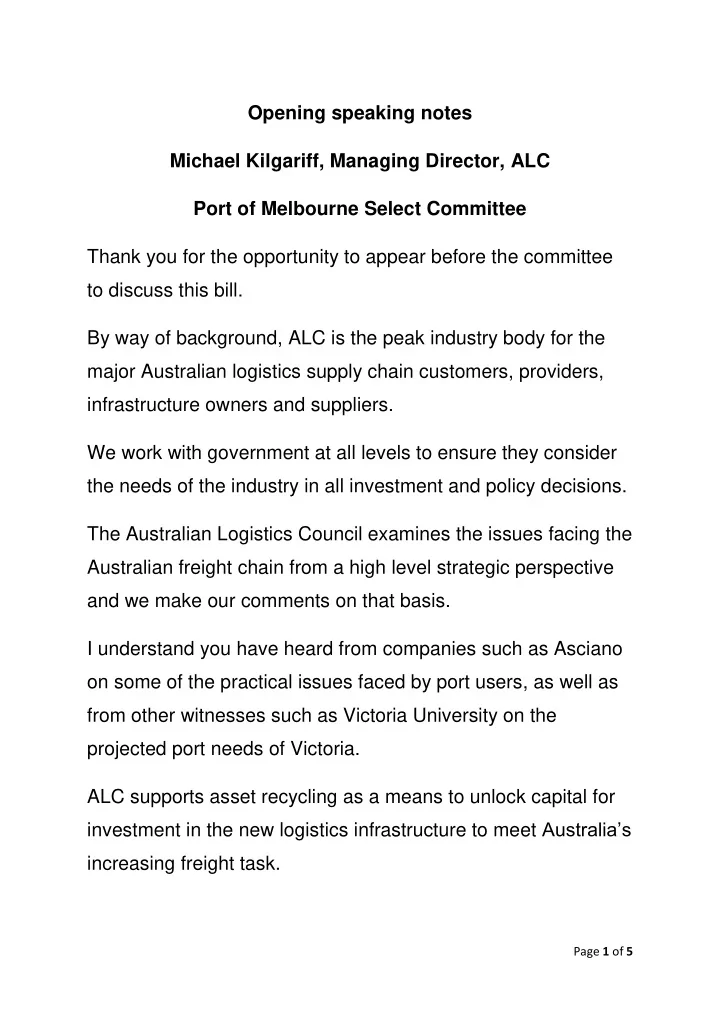

Opening speaking notes Michael Kilgariff, Managing Director, ALC Port of Melbourne Select Committee Thank you for the opportunity to appear before the committee to discuss this bill. By way of background, ALC is the peak industry body for the major Australian logistics supply chain customers, providers, infrastructure owners and suppliers. We work with government at all levels to ensure they consider the needs of the industry in all investment and policy decisions. The Australian Logistics Council examines the issues facing the Australian freight chain from a high level strategic perspective and we make our comments on that basis. I understand you have heard from companies such as Asciano on some of the practical issues faced by port users, as well as from other witnesses such as Victoria University on the projected port needs of Victoria. ALC supports asset recycling as a means to unlock capital for investment in the new logistics infrastructure to meet Australia’s increasing freight task. Page 1 of 5
In summary, ALC believes that when considering a particular transaction, parties should consider: Whether the proposed sale will promote competition and efficiency; and Whether the asset should be the subject of economic regulation (and how much), so as to permit the efficient use of the asset to the benefit of the Australian community as a whole. Viewed against these touchstones, ALC members support the proposed lease of Port of Melbourne. The full ALC position will be contained in the submission filed with the committee. However, in opening, on the basis of comments on the Bill made by our members, we would suggest there are two particular areas where the legislation could be improved. 1. The economic regulation that is proposed in the bill. 2. Operation of the Victorian Transport fund. The first relates to the economic regulation that is proposed to be contained in the bill. Page 2 of 5
As recently as 4 September – just last week – the Chairman of the ACCC, Rod Simms, remarked in a speech that the recycling of assets to access funds creates a strong incentive for governments to structure their privatisation processes in a manner that maximises the sale price they receive . ALC members are particularly concerned that the ACCC is excluded from reviewing any ‘primary agreement’ connected with the transfer of port assets from the Port of Melbourne corporation to a new port operator. This is because the concept of what is a ‘primary agreement’ includes documents ‘connected with’ the transaction – it therefore could include agreements including whether compensation is payable if a second Victorian port is commissioned. ’ The ACCC should be able to examine all relevant documents to consider the competition ramifications of the proposed transaction, as has been the case in other states’ port transactions. We also note that the Harper competition review said part IIIa of the Competition and Consumer Act is a ‘backstop’ supporting many industry-specific access regimes. Page 3 of 5
The Essential Services Commission has also said the current Port of Melbourne Corporation has substantial market power because of: the lack of viable substitutes, a lack of countervailing power held by customers and high barriers to industry. So that the federal ‘backstop’ is unnecessary, Victorian economic regulation should be as comprehensive as possible. We are therefore concerned the Bill appears to be designed in a way that excludes the capacity of the Essential Services Commission to consider competition issues arising from leases offered by the port operator to stevedores. More generally, price orders are designed so that the regulatory regime can only be implemented if the Governor makes an order in Council on the recommendation of the Essential Services Commission Minister. We believe that all port users should be able to apply to the Essential Services Commission as of right, for it to consider whether it is appropriate to make an order with respect to the prices charged to port users. The other main ALC issue relates to the operation of the Victorian Transport fund. Page 4 of 5
We note the fund is designed in a manner similar to the Restart NSW fund. However there is one key difference. The NSW legislation allows funds to be expended on projects approved by the minister on the recommendation of infrastructure NSW. ALC passionately believes that the benefits of asset recycling must be invested into infrastructure that provides the productivity benefits that will increase the welfare of all Victorians. So industry has confidence that the funds locked up in mature assets will be used in the most economically efficient manner, thus improving the welfare of all Victorians, ALC believes that a similar provision should be added to this bill. I thank the committee and my colleague and I would be happy to take questions. Page 5 of 5
Recommend
More recommend